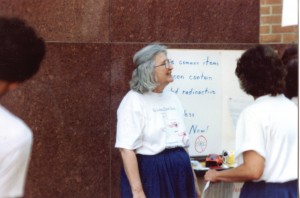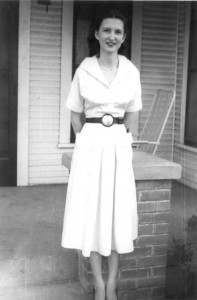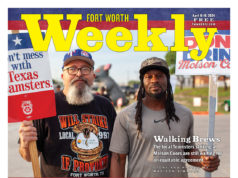“We always had a special relationship because she was so proud of her My Lai story, and I was too,” Lane said. “It was a delicate issue, and she handled it just right.”

With the Globe clipping in her portfolio, she began penning op-ed pieces for the Fort Worth Press and Fort Worth Star-Telegram. By 1974, when construction began on the Comanche Peak Nuclear Power Plant in Glen Rose, she was ready for a new fight, one that would continue for the next three decades.
“Her activism on Comanche Peak made [the plant] safer than it ever would have been,” Mabe said.
Lane became a Fort Worth City Council member in 1993, and Brink joined the Weekly staff three years later. Their mutual respect remained even when they butted heads over issues.
“I aligned with her on a lot of things while I was on the city council and got misaligned with her on a lot of other things, but she was a good reporter,” he said. “Her problems with me every once in a while were because she was so damn opinionated and so was I.”
City officials cringed when they heard Brink was on the phone seeking an interview, he recalled.
“The Weekly wasn’t always everybody’s favorite,” Lane said. “And when the phone call came from Betty Brink, people got excited –– it was ‘Oh shit, I wonder what she’s found out.’ She believed if you were an elected official you had to tell her what she wanted to know.”
Eddie Griffin, a longtime leader in Fort Worth’s African-American community, respected Brink and her advocacy for minority neighborhoods. But they clashed as well.
“We fought about the schools,” he said. “She did not like [former superintendent] Melody Johnson, and I loved Melody.”
Johnson resigned last year, perhaps in part due to Brink’s intense scrutiny and willingness to expose the school board’s infighting.
“But that’s what reporters do,” he said. “Betty was a great person.”
Brink’s eagerness to slay every Goliath made for gripping stories, which pleased her editors and publishers. But she flung stones just as fiercely inside the newsroom. She clashed with Star-Telegram editors when she felt her stories were being quashed or watered down.
She found a better fit at the upstart Weekly but still took swings at her bosses.
She screamed at a corporate official for New Times Media after the company purchased the paper from Camuto in 2000. New Times owned a chain of alternative weeklies, including the Dallas Observer.

Less than a year later, in the midst of a recession, things were looking grim, and Weekly staffers knew bad news was coming. New Times executives arrived at the newspaper one morning and started calling people one by one into Forsyth’s office. When the staffers walked back out, they’d been laid off. Everyone on the small staff waited to see who would be next.
Brink was fuming. She tried to rally the staff into an organized revolt. Strength in numbers, she said, eager to form a spontaneous labor union. She volunteered to give up some of her pay if it meant saving jobs. But her co-workers sat with heads down, content to await their fates.
Brink grew quiet until one of the suits stepped out of the conference room to call another name. Then Brink gave him a spirited tongue-lashing. You should be ashamed of yourself — you’re handling this horribly, have some humanity, she yelled.
Despite her insurrection, she kept her job.
A year later, New Times sold the paper to current publisher Lee Newquist. He too would feel Brink’s wrath. The paper hired Pulitzer Prize-winning journalist Dan Malone in 2002, and Brink resented that he was getting paid more than her.
“We do the same job, so we should be paid the same,” she said.
She accused Newquist of discrimination and demanded equal pay. Newquist didn’t bite. So Brink showed up at the office one day with an attorney and threatened to sue the paper. Newquist held firm. Brink’s lawsuit created a stir among journalists across the Metroplex, and the Star-Telegram, Observer, and other media wrote about her legal fight.
The case went to mediation, and Brink and Newquist eventually came to an agreement.
A few years ago, health concerns led her to cut back her work hours and then to return to freelance status. But she was still hard at work on stories for the paper when she suffered the stroke in September that eventually led to her death.
A couple of weeks ago, the publisher paid a visit to Brink’s home and stood by her bed. Withered by the stroke and drifting in and out of consciousness, she still had some fight left. She teased Newquist, saying she had probably scared him over the years.
“No, you never scared me,” the publisher said.
“Not even a little?” Brink said.
“Well, maybe a little,” Newquist said.
In her years at the Weekly, Betty won many national, state, and regional awards. But more important to her than the awards were the people and the causes that her stories helped. She wrote about corruption, injustice, and discrimination wherever she found them –– in the schools, at city hall, outside power plants and cement plants, and, in one of her longest-running series, behind the bars of the Carswell federal prison hospital for women.
Last year the Tarrant County Trial Lawyers Association awarded Brink the Laurence “Lanny” Priddy Pursuit of Justice Award, citing her “courageous” stories that uncovered corruption and injustice for more than four decades. Brink was grateful but downplayed her role.
“I have to confess, the courage was never mine,” she said. “It was always the courage of others, those who came forward to expose corruption in government, to speak of being raped in prison, to show discrimination in the workplace, blow the whistle on fraud or bullying in a public school, or corners cut at a nuclear power plant — all at the risk of not only losing their jobs, but possibly their lives. I was simply their voice.”
We miss that voice already.
Betty Brink is survived by husband Charlie; daughters Priscilla, Deborah, Rebecca, and Sarah and their spouses; son Allen and his wife; sister Suzanne; 16 grandkids, 19 great-grandkids, and two nephews.
A memorial service will be held at 3 p.m. Saturday at Unity Church of Fort Worth, 5501 Trail Lake Drive.
In lieu of flowers, the family asks that memorial contributions be made to the Betty Brink Journalism Scholarship fund. Contributions may be sent to EECU at 1617 W. 7th St., Fort Worth TX 76102.












I didn’t know Betty for nearly as long as everyone else. I’m just a 26-year-old upstart who’s worked at the Weekly full-time for less than a year. Unlike many veteran journalists that I’ve known, however, Betty treated me like a complete equal. As far as I could tell, she didn’t have a condescending bone in her body. I took over some of the stories that Betty would have written, and she was more complimentary of my work than it probably deserved. Every time I would tell her that so-and-so had talked about how talented she was, she’d always deflect the praise and bring it back to what I was doing. Betty wasn’t just a great journalist, she was a first-class human being and a woman who has always been ahead of her times, as evidenced by the cover story this week. Wherever I go in this career, I’ll take memories of her indomitable spirit with me.
Betty was forward thinking and rarely talked about her past exploits. She lived in the present. She was the first person I knew to buy a hybrid car. She was about 70 at the time. I gave her a hard time for spending $30k on a dinky little car with little power, but she was proud to own it. We clashed over a lot of things during the 12 years I worked with her, but none of our disagreements caused any problems in our friendship. I always enjoyed hanging out with her and taking her to Mexican food dives on the North Side to discuss stories we were working on. She’s the only person I know who would order a plate of enchiladas and a hot cup of black coffee to wash it down.
I was one of a few twentysomethings and college students who worked at FW Weekly when it started in the 1990s, in that little frame house where Lanny’s is now. We were in awe of Betty. We loved her stories about fighting injustice, and envied her ability to get the story and make her subjects, many of whom she took down with her words, still admire her. She treated every one of us, from full-timers to freelancers to interns, as equals. Her encouragement was welcome, her praise cherished. And she was always the hit when we met for an after-work beer. We’ll miss you, Betty. The world needs more like you.
I’m deeply saddened by this loss. I met Betty when I worked as the Art Director for the Fort Worth Weekly. Before I knew anything about her my first impression was, “What an extremely interesting and eccentric woman. I wan’t to be like her when I’m her age!” Then, as I got to know her over the years, I realized just how special she was. I was always glad to see Betty come into Production. I loved her stories and she loved my covers. 🙂 She lifted my spirit whenever I saw her. I will always admire you, Betty. You will always be one of my biggest role models. R.I.P. We love you.
What a beautiful tribute to a person who truly used their time on earth to benefit others and make the world a better place. Unlike those who claim to be civil rights activists, Betty “walked the walk”. Always the professional, investigative, journalist, her sole purpose was to uncover the truth, and speak for those who had no voice. Betty never let her “like” or “dislike” of a political figure get in the way of the truth. She dug for the facts and let the facts tell the story. Writing about FWISD was almost a full time job as the available material was abundant and remains never-ending. That has not changed. Tocco, Johnson, Dansby – to read Betty’s story on one, is to read a story on the other. The names have changed but the deeds and lack of leadership remain the same. I believe with her work on the AHHS/Palazzolo story, her great disappointment was the failure of taxpayers to take the importance of School Board membership seriously. She believed many on the Board were simply out of touch and had been there too long. She focused on FWISD because that is where she was needed. She was a true Texan who should forever remain an icon of Fort Worth.
Well said. Even though I often disagreed with her,she was some kind of fine Texas lady,and had a much more interesting life than I would have suspected. Her husband, children and grandchildren are obviously so proud of this wonderful woman. In fact, her life story –especially regarding the research of prison conditions at Carswell federal prison– would make an interesting movie screen-play….just sayin’. (and no, I don’t work for the FW school board,etc.)
BettyB’s absence already felt. I will miss her hard hitting articles and living proof no matter what your age, you can make a difference. She was a journalist and seeker of truth and justice all her life. May her family take pride in that and may she serve as an example to us all.
RIP.